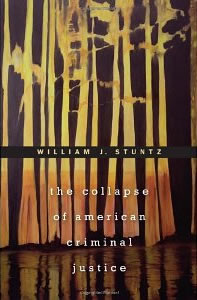Book Notes
 William J. Stuntz, The Collapse of American Criminal Justice (Harvard: Harvard University Press, 2011), 413pp.
William J. Stuntz, The Collapse of American Criminal Justice (Harvard: Harvard University Press, 2011), 413pp.
Bill Stuntz cut an unusual figure as the Henry J. Friendly Professor of Law at Harvard University — former clerk for Justice Lewis F. Powell, a brilliant legal scholar, politically conservative by Harvard standards, and a Christian active in campus ministry. His death in March of 2011 after a three-year battle with colon cancer was followed by an obituary in the New York Times, which noted that Cambridge University Press will publish a book of essays about his scholarship. Stuntz completed the final manuscript for this book only a few weeks before he entered hospice care; and when the New York Review of Books reviewed it (see the November 10, 2011 issue), they gave that task to Justice John Paul Stevens.
Stuntz documents the many ways and reasons that our criminal justice system is "wildly unjust." We imprison more citizens than the former Soviet Union. The bloated prison population is not only a disaster, but a "pointless" disaster, for it doesn't deter crime and it doesn't have to happen (and did not happen in past decades). Throughout the book he focuses on how disparity and discrimination differ according to race (blacks v. whites), class (rich v. poor), and geography (north v. south). Stuntz identifies three symptoms of this dysfunction.
First is the collapse of the rule of law under the weight of procedure. Some 96% of felony convictions are reached by plea bargains, which means that almost no one is judged by a jury of peers based upon the substance of the law and the merits of the case. The arbitrary discretion of police about whom to arrest and by prosecutors about what charges to bring drive the system. Second, the disparity of the system hits hardest among black victims and suspects. The 14th amendment of "equal protection under the law" has become "all but meaningless" for blacks, says Stuntz. Places with high crime rates like cities often have elected officials from suburbs who have no vested interest in their neighborhoods. Third, across the last century there have been wild pendulum swings between excessive leniency and severity, with predictable consequences for crime and punishment.
In his final chapter Stuntz makes four proposals. First, more police in the highest crime areas should reduce crime and the prison population. In particular, we need a more local and robust form of democracy in which residents elect the police, judges, and juries that will oversee the law enforcement under which they live. This should breed confidence about getting a fair shake, rather than the current crisis of legitimacy. Second, we need a revival of the equal protection clause of the 14th amendment. Third, Stuntz believes that giving judges greater discretion would temper the highly politicized justice in matters like mandatory sentences. Finally, like many other observers, Stuntz is frustrated at the disproportionate impact of the "drug wars" on way too many people, and so he would revise the severity of drug laws and punishments. In the end, Stuntz says he has hope, although he's not optimistic. At least this magisterial book of meticulous scholarship with its plea for justice makes an excellent case that we can and should do better.


